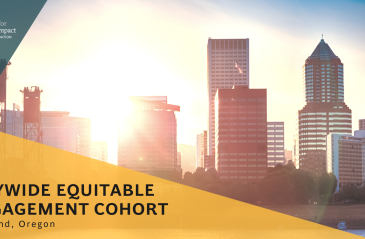
Five things we recently learned about difficult conversations

Trust, discontent and hope were all covered in our #FindingLegitimacy conversation in Mexico
Share articleTrust and legitimacy are about shared values and equitable decision-making #FindingLegitimacy
Share articleAmbitious promises must go beyond mere words and evolve into real impact #FindingLegitimacy
Share articleWe put our vision for government into practice through learning partner projects that align with our values and help reimagine government so that it works for everyone.
Trust, fairness, expectations, discontent, scepticism - but also hope - came up in our Finding Legitimacy conversation in Mexico.
C Minds by PIDES, in partnership with the Centre for Public Impact, recently hosted a roundtable for 14 attendees from academia, international and national NGOs, industry and government in Mexico City to explore what legitimacy means in Mexico today. So, what did we discover?
As many countries across the globe, the Mexican government is suffering a loss of trust from its citizens. But what does it mean when trust is low? How does it affect government legitimacy? And how does it affect people's lives?
We heard that legitimacy is about the relationships between government and citizens, between the individual and their local delegates, deputies and governors, and with the Supreme Court and the Presidency. It is a complex relationship that, according to participants, has been working in favour of a small group of elites for generations.
But trust and legitimacy are also about shared values and equitable decision-making, about ensuring that no-one gets left behind. Participants said that legitimacy is a “shared responsibility” of citizens and governments - it's about working together.
This is not always the case, as became apparent during the recent earthquakes. “Citizens no longer wait for help from the government,” said the representatives of civil society organisations. In crisis situations, civil society has been able to provide help much faster and more effectively than government - by using modern technology and social media.
Government representatives took a different view: the biggest challenge for government during the earthquake, we heard, was trust. The Department of Health, for example, had sent staff to provide support during the earthquakes, but they were unable to help because citizens did not trust them.
Inequality and preferential treatment also emerged as key problems. For example, electricity services were back up and running within six hours of the earthquake in the richer areas of Mexico City, but it took many days for power to be restored to other parts. Such inequality exists not only within the city limits, participants said, but stretches across the whole country, with entire states and their citizens feeling left behind.
The government is trying to address these legitimacy challenges through new legislation, including a new anti-corruption law. However, new laws risk undermining credibility more than strengthening it, said one participant, because they might not be properly enforced.
Similarly, government attempts at greater openness and transparency, especially at the municipal level, were perceived to have had very little public impact. Certain participants considered that some open government initiatives were only creating an illusion of openness, and gave two main reasons: firstly, if citizens mistrust government, they will mistrust the data it makes publicly available; and secondly, with few Mexicans being able either to access or make sense of the data, the value of certainin itiatives for most citizens remains low.
“It's not a crisis of legitimacy, but rather a malaise,” said two attendees, while others insisted that “there needs to be a radical turning point”. While the government is taking steps towards reducing corruption with the new anti-corruption law, the real challenge resides in implementing it at all levels of government. All agreed that society had become too accepting of corruption, and that a clear and radical commitment to overcome it was policymakers' most important challenge.
Such a commitment would also help address citizens' need to have a clear understanding of where their country is heading: “there is currently no notion of where to go,” one participant said. Without a vision, citizens cannot hold the government to account, they cannot engage with and support their country's direction. “If we don't know where to go, we can't make decisions to move forward. Do we want more government or less? More civil society or less?” This lack of a defined path, however, might simply be the result of today's global challenge of short-termism in administrations
Citizens want to participate, but in the current environment they feel that it is “a search without knowing what to look for”. Without knowing how decisions are taken or who the decision-makers are, and without knowing how decisions are implemented or to what end, citizens feel undervalued and disenfranchised. They do not believe that government is listening to their concerns.
Attendees also recognised that it is not just government that has an impact on legitimacy - journalists also play a role. During the September 19th earthquake, inadequate news led to further distrust of institutions.. ..
“What we gain from legitimacy is that other actors, and not just the government, benefit as well,” said one participant. For government and citizens both, strong legitimacy means governing in a way that gives citizens a clear path to connect with those who represent them so they can have a say in how they live their lives. In summary, it means being “excited again to go to the polls,” as one participant put it.
To achieve this, much needs to be done and many questions need answering. The government must think about ways of addressing legitimacy and ensuring that ambitious promises go beyond mere words and evolve into real impact across the length and breadth of Mexico.
C Minds by PIDES is an impact innovation agency that designs strategies for inclusive economic and social development through cross-sector collaboration and the use of new technologies. You can read more about their work here.
What is legitimacy to you? Where do you see legitimacy working well? How governments work with citizens to build legitimacy is a big question for CPI.
Find out how to get involved in our Finding Legitimacy project
Finding legitimacy - CPI is starting a global conversation for better outcomes. Nadine Smith introduces a new research programme about legitimacy from the Centre for Public Impact.
Introducing the Finding Legitimacy regional champions. We meet the regional champions of CPI's #FindingLegitimacy project
Building trust and legitimacy through innovation. Mexico's Director of Public Innovation, Enrique Zapata, talks legitimacy, impact and improved women's health
Mexico's quest for competitiveness. As director general of the Mexican Institute for Competitiveness, Juan E. Pardinas, is ideally placed to report on his country's to maximise its economic impact - he tells us how they've been getting on
Crossroads of a country: mapping Mexico's future. Rolando García Martínez of Mexico's National Conference of Governors tells us how bridging policy differences can maximise impact.
Mexico on the move. As deputy chief of staff to the president of Mexico, Raymundo Balboa certainly has his hands full. He tells about priorities and plans for the future
Building a better Mexico. Francisco Gonzalez Zozaya takes time out from serving as Mexico State's Infrastructure Minister, to tell us about his role and plans for the country's future
Mexico's moment: powering the country's economic future. Mexico's President Peña is on a mission to shake up his country's business, social and political structures. But no reforms matter more than those revolutionising its energy sector, explains Eduardo León











